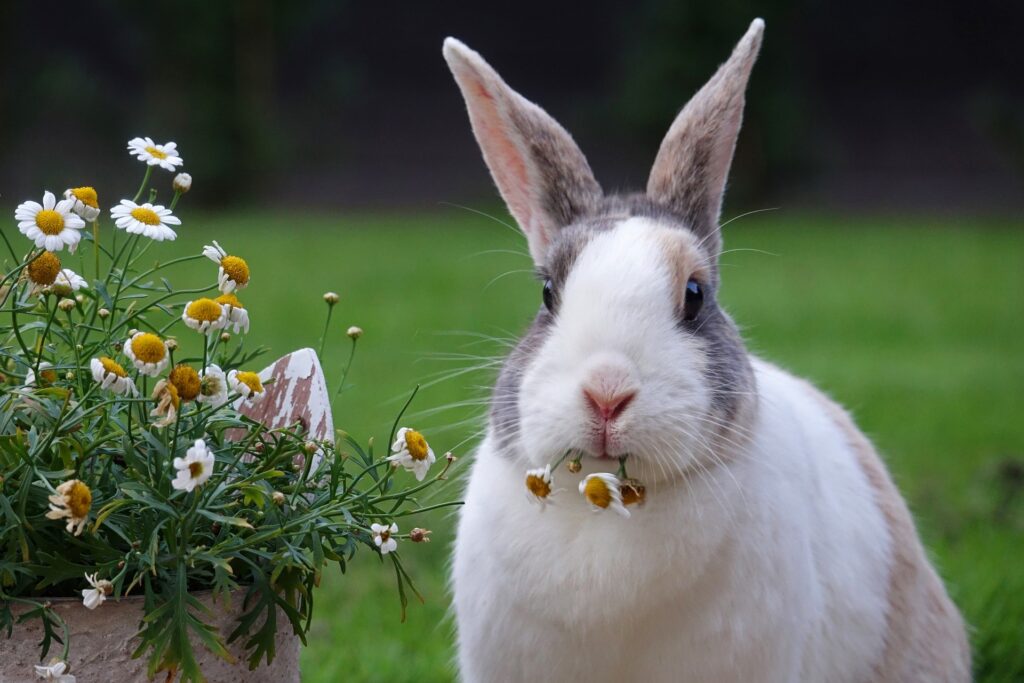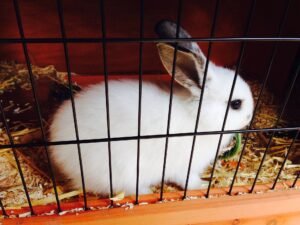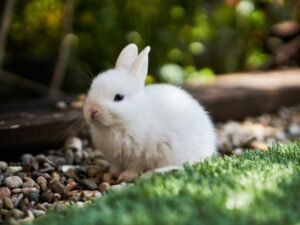60% OFF Rabbit Food – Buy the Cheapest, Nutritional and Healthy Rabbit Food
Rabbits are cute and fluffy animals that make great pets. They are herbivores, that means they only eat plants. As a result, it is important to feed them with a nutritionally food or a variety of Rabbit foods like- Hay, Fresh Vegetables, Pellets and Treats, that fulfil their nutritional needs. A balanced diet can improve their general health and reduce their chance of getting common health issues. This post will explain what rabbit food is and how to make sure your rabbit is receiving enough nourishment.
What Do Rabbits Eat?
The natural diet of wild rabbits consists of grass, hay, and leafy greens. However, pet rabbits require a more diverse diet to ensure they receive all the necessary nutrients they need. Rabbit food should consist of the following:
1. Hay:
Hay is the staple food of rabbits. Provides the fibre you need to maintain healthy bowel function and prevent dental problems. The two most common hay varieties are timothy and alfalfa. Timothy hay is best for adult rabbits and alfalfa hay is best for young rabbits.
Best and Nutritional Hay for Rabbit Online:
2. Fresh Vegetables:
Fresh vegetables provide additional nutrients to your bunny’s diet. Vegetables such as carrots, broccoli, celery and peppers are rich in vitamins and minerals that are essential for a healthy rabbit.
Buy Fresh Vegetables and Dry Vegetables Online:
3. Pellets:
Pellets are made to provide full weight and balanced nutrition for rabbits. It is important to choose high quality pellets that are high in fibre and low in fat. Pellets should form only a small part of your bunny’s diet and should not replace hay or fresh vegetables.
Best and Cheap Pellets Available Online:
4. Treats:
Treats such as fruits and commercial rabbit treats should be given in moderation to your rabbit. Too many treats can cause digestive problems and obesity. Choose or buy the best food for treats from the given below list.
Add Treats and additional food for your Rabbit, Buy Online:
How Much Food Should You Feed Your Rabbit?
Rabbits have unique nutritional needs and feeding them the right amount of food is very important to maintaining a healthy weight. The amount of food your bunny needs depends on his age, weight and activity level.
Adult rabbits should have a diet consisting of:
- Unlimited access to hay
- 1/4 to 1/2 cup of fresh vegetables per day
- 1/8 to 1/4 cup of pellets per day
Young rabbits require a higher calorie diet and should have access to:
- Unlimited access to Alfalfa hay
- 1/4 to 1/2 cup of fresh vegetables per day
- Unlimited access to pellets
It is important not to overfeed your Rabbit, as obesity can lead to serious health problems such as liver disease and arthritis.
Common Rabbit Health Problems
A balanced diet is important to maintaining your rabbit’s health. Here are some of the most common health problems that can occur due to poor nutrition:
Dental Problems:
Rabbits have continuously growing teeth that need to be worn down through eating hay and other roughage. A diet that lacks fibre can cause teeth to grow too long and lead to dental problems such as malocclusion.
Gastrointestinal Stasis:
Gastrointestinal stasis occurs when the digestive system slows down or stops working altogether. This can happen if your bunny does not get enough fibre in its diet. Symptoms include a lack of appetite, decreased activity, and small or no faecal pellets.
Obesity:
Obesity is a common problem in pet rabbits that are overfed or not given enough exercise. Obesity can lead to serious health problems such as liver disease and arthritis.

Tips for Feeding Your Rabbit
Here are some tips for ensuring that your Rabbit is getting the right nutrition:
- Provide Fresh Hay:
Hay should be available to your rabbit at all times. Make sure it is fresh, dry, and free from mould and dust.
- Variety is Key:
Offer a variety of fresh vegetables to ensure that your rabbit gets a range of nutrients. Rotate different vegetables and fruits to keep things interesting for your bunny.
- Choose High-Quality Pellets:
Choose pellets that are high in fibre and low in fat. Avoid pellets that contain artificial colours, flavours, or preservatives.
- Treats in Moderation:
Treats should be given in moderation and should not replace hay or fresh vegetables. Fruits should be given sparingly due to their high sugar content.
- Water:
Ensure your rabbit has access to fresh, clean water at all times. Change the water daily and use a water bottle rather than a bowl to prevent spills and contamination.
- Consult with a Vet:
If you are not sure about your Rabbit’s dietary requirements, consult with a veterinarian who specialises in rabbit care. They can provide advice on the right diet and portion sizes for your Rabbit.
Video Credit – Rabbit Food: Victoria Raechel
Conclusion and final words on Rabbit Food:
For your rabbit’s health and well-being, a balanced diet is essential. You can assist in ensuring that your rabbit gets all the nutrients it needs by giving her a diet consisting of hay, organic vegetables, pellets, and treats in moderation. Keep in mind to feed your rabbit in the proper portions and to avoid overfeeding or giving them too many treats. You can assist your rabbit in living a healthy, happy life by paying attention to these tips.
Thanks for Reading Rabbit Food❤️😍 Have a Wonderful day😊🤗
FAQ on Rabbit Food:
-
What kind of hay should I feed my rabbit?
Timothy hay is the best choice for adult rabbits since it has less calcium and protein than Alfalfa hay. Alfalfa hay is better for young rabbits and pregnant or nursing rabbits because it contains more calcium and protein.
-
Can I give my rabbit fruits as a treat?
Fruits should be given in moderation, as they are high in sugar. Small pieces of fruits such as apples, pears, or bananas can be given as a treat once or twice a week.
-
How much pellets should I feed my rabbit?
Pellets should make up only a small portion of your rabbit’s diet. Adult rabbits should be fed 1/8 to 1/4 cup of pellets per day, while young rabbits should have unlimited access to pellets.
-
Can I feed my rabbit vegetables every day?
Yes, rabbits should have access to fresh vegetables every day. Provide a variety of vegetables to ensure that your bunny receives a range of nutrients.
-
Can I feed my rabbit human food?
It is not recommended to feed your rabbit human food, as it may not provide the necessary nutrients and can cause digestive problems. Stick to a diet of hay, fresh vegetables, pellets, and occasional treats.
-
Can my rabbit eat grass from the yard?
Yes, rabbits can eat grass from the yard, as long as it has not been treated with pesticides or herbicides. Make sure the grass is clean and free from contaminants.
-
Can I give my rabbit a salt lick?
Salt licks are not necessary for rabbits, as they get enough salt from their food. Providing a salt lick may lead to overconsumption of salt, which can cause health problems.
-
Can rabbits eat herbs?
Yes, rabbits can eat a variety of herbs such as parsley, cilantro, and basil. Herbs should be given in moderation as a treat and should not replace hay or fresh vegetables.
-
How often should I clean my rabbit’s food bowl?
Rabbit food bowls should be cleaned daily to prevent contamination and bacteria growth. Use soap and water to clean the bowl thoroughly and rinse it well before refilling it with food.
Recommended:
Rabbit Price in India, USA, UK | Everything you need to Know about Rabbits




























